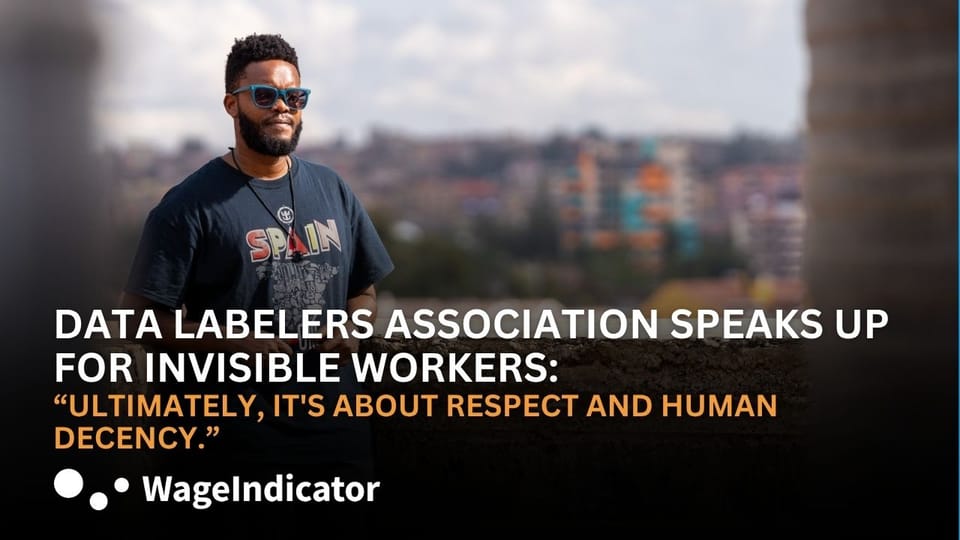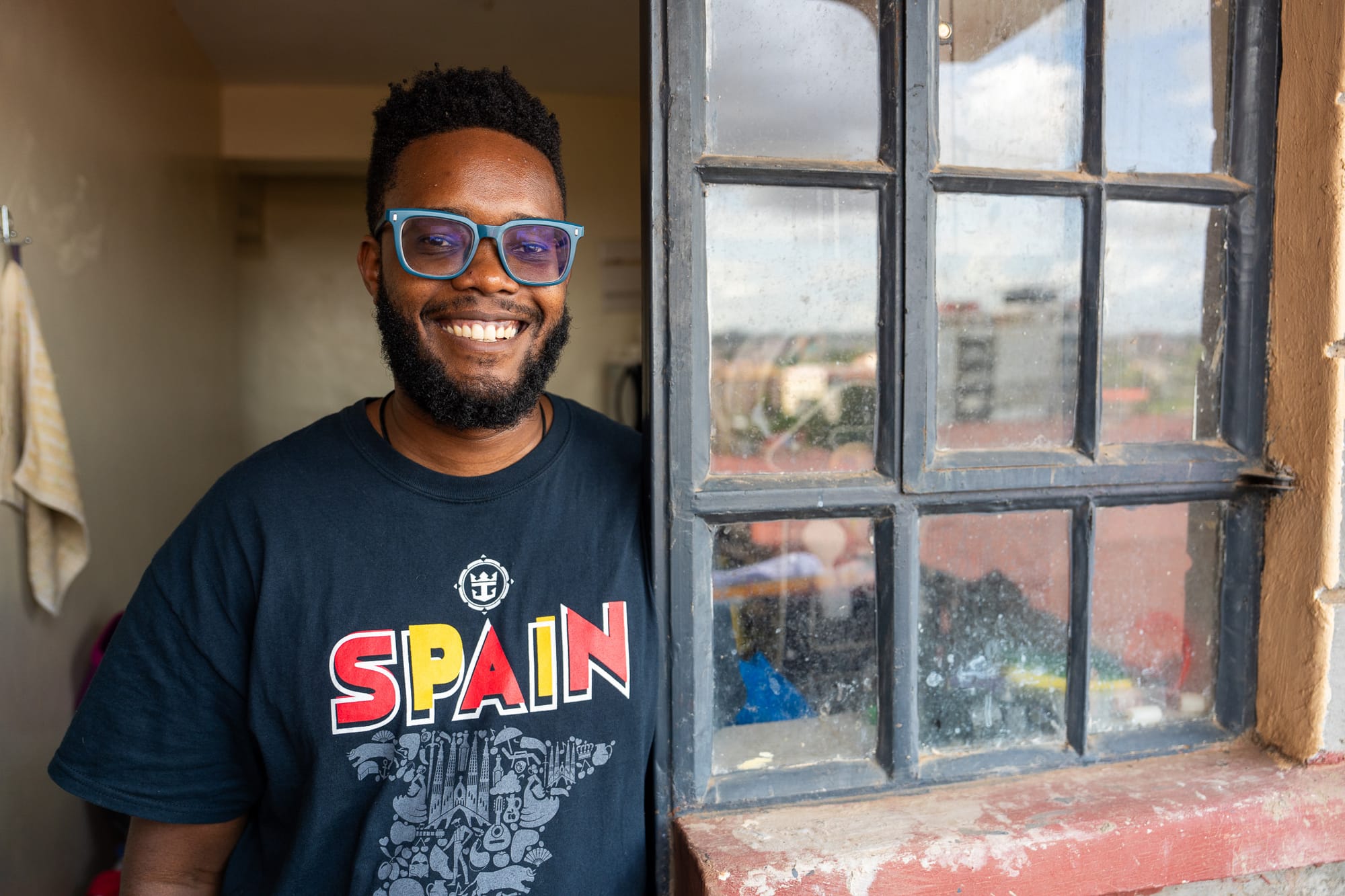Data Labelers Association speaks up for invisible workers: “Ultimately, it's about respect and human decency.”

As you may have noticed, the rhythm of this newsletter is a bit... disrupted. It's not that I'm not doing anything: with all the projects I'm currently working on, the newsletter has fallen by the wayside. What am I working on? Here's a brief summary of the most important things.
- A minimum rate for self-employed workers: Did you know that 43% of the global worker population is self-employed? And that there are virtually no minimum rates for this group? Working with the WageIndicator Foundation, I am involved in the further development of a new “cost-based” minimum rate for self-employed workers worldwide: the Living Tariff, which is based on the widely recognised Living Wage methodology. Last month, I had the opportunity to present a paper I wrote on this topic (not yet published, so please be patient) in Geneva at the ‘9th Regulating for Decent Work Conference’ on ‘Strengthening labour institutions and worker voice to deliver decent employment’, organised by the International Labour Organisation. For those who are unfamiliar with this organisation, think of it as the UN for labour. Still a bit too much for employed workers, so it was high time to stir things up a bit ;-) In this post, you can read more about it.
- Data portability for platform workers: in my part-time role at the Amsterdam University of Applied Sciences in the Civic Interaction Design research group, I am researching the impact of data sharing with workers around my GigCV project. Now that the project has been running for three years, there is enough data and experience to conduct research. For example, I am working with researchers from Twente University to look at what data workers want to take with them and what they expect to do with it. I am also working with researchers from VU University Amsterdam to use data from participating platforms to examine the impact that the possibility of downloading and the actual downloading have on the behaviour of workers on the platform. In addition, I am working with the Jobtech Alliance to invite platforms in Africa to share data via the GigCV API (I travelled to Nairobi for this, read more about it here, there are four platforms in the pipeline) and I am working with the Freshheads team to take the API to the next phase and add new functionalities, such as a written review selection tool.
- Research collaborations: I contribute to various independent research projects in different roles. These include a study with Maastricht University, ROA and YoungOnes into the motivational factors of freelancers on online gig platforms. I also collaborate with various researchers around the world on topics that appeal to me.
- Presentations and advice: on the impact of technology on society and, in particular, on work. Always in a way that does not compromise my independence.
In this edition, a blog, podcast and video (I have decided to take my cameras with me more often, because video also appeals to a certain target group and I am already lugging around equipment for photography and podcasts ;-)). In Nairobi, Kenya, I interviewed Ephantus Kanyugi, part of the Data Labelers Association. A podcast in a series exploring the human role in the AI supply chain. In this newsletter, I share my findings. I am also trying to bring this topic to the forefront of discussions about AI in other places. It's not easy, because the idea that 150 million (mostly poorly paid) workers are needed to keep the magical AI running does not fit the picture painted by organisations and experts. Nevertheless, I persevere, not only because it's fun and keeps me on my toes, but also because it's important to stay sharp in order to continue to have a well-informed debate. As I tried to do in this comment:

Have a great summer!
Data Labelers Association speaks up for invisible workers: “Ultimately, it's about respect and human decency.”
What are the advantages, disadvantages and challenges of data work? Who are the people who annotate and correct the data behind AI (so-called “data workers” or “data labelers”)? In the previous two episodes of The Gig Work Podcast, I spoke with researchers Claartje ter Hoeven and Antonio Casilli about this topic. But if you really want to know what it's like to train AI with data, it's best to ask the workers themselves. That's why I visited Ephantus Kanyugi (30) in Nairobi. He is a data labeller himself and a pioneer for the labour rights of his colleagues in Kenya.
From economics student to data labeller
Kanyugi had always been interested in working with computers, but he chose to study economics because he thought he would have better job prospects in the financial sector. However, after graduating in 2016, he was unable to find work. ‘There were very few job vacancies and I had no work experience or connections in the financial world.’
To make ends meet, he did simple jobs that paid little: selling clothes on the street and looking after animals. Until a friend told him about vacancies at CloudFactory. ‘You didn't need any qualifications or experience, you just had to take a test to show that you could think analytically and were good with computers,’ says Kanyugi. "That's how I got my first job in the AI sector as a data labeller."
Working conditions at the office
The work was interesting, he says. He worked four-hour shifts, with simple tasks in the morning and a more challenging project in the afternoon. He had a lot of variety. Sometimes he worked with images, other times with geographical maps. But the working conditions were poor. Kanyugi worked on a contract basis and earned just enough to stay below the tax threshold. He earned around 20,000 Kenyan shillings per month (about 180 dollars), but his travel expenses alone were around 80 dollars.
‘There were two groups within the company: regular employees and freelancers,’ he says. ‘Regular employees received insurance, a pension, bonuses and maternity leave. As a freelancer, you were only paid for the hours you worked. If you were sick or on leave, you just had to hope there would still be a place for you afterwards.’

From office to working from home
In 2020, he discovered the Remotasks platform. Via this website, he could earn money from home doing data annotation. He created a profile on the platform and accepted all the terms and conditions. He thinks he was one of the first people in Kenya to do this.
In the beginning, he earned well: 10 to 20 dollars an hour. ‘To earn a decent wage, I worked eight hours at CloudFactory and then another eight hours for Remotasks,’ he says. ‘But I soon quit my job at CloudFactory because I earned a lot more working remotely.’
Significantly less paid
He now worked 16 hours for Remotasks. In the beginning, this provided him with a good salary, but the payment soon decreased. The more people started working via the platform, the less he earned per project.
‘While I used to earn 10 dollars an hour, I later worked three hours for just 2 dollars,’ he says. ‘In addition, the tasks became more complicated. What’s more, the company could also reject your work, even if one image was not annotated correctly or if you simply took too long. Then you didn’t get any money at all, not even for the hours you worked.’
All this meant a lot of unpaid labour. ‘I had to work more and more hours at the computer to make ends meet,’ he says. ‘It was exploitation, but I was so deep in it that I didn't realise it. What's more, there were other things that weren't right.’
Human rights violation
An example is a client who promised him £10 for 12 photos or videos of smiling, playing children.
‘Later, they said that one of the 10 images was “no good”, so they didn't pay you anything for the whole series,’ he says. ‘Afterwards, I realised that they were exploiting our work and also violating the privacy of children, without us even noticing.’
There were more privacy issues. For example, Kanyugi was monitored via tracking software and his webcam while working on his computer. He was required to turn it on during work. ‘I have no idea if the company stored those images and what happened to them,’ he says. ‘Furthermore, the images I had to classify were sometimes very disturbing. Some projects contained nude images or even images of deceased people.’

Data Labelers Association
But he only realised that his work situation was unlawful when he met researcher Berhan Taye from Stanford. With her “AI Harms” project, she is researching the adverse effects of the development of artificial intelligence. She wanted to know more about the working conditions of Kanyugi and the other data workers. Kanyugi: ‘We came to the conclusion that this way of working was a violation of our human rights.’
At the end of 2023, he and nine other data workers formed a collective to stand up for their rights. They wanted to start a trade union, but that proved difficult in Kenya. So, in early 2025, they founded an association: the Data Labelers Association.
The full interview is available on YouTube
Strong growth and goals
The association is growing rapidly, mainly thanks to word of mouth. All the founders were trainers who had trained thousands of new labelers and still had their contact details. Within a few months, the association already had 800 members. Kanyugi: ‘Most members keep their membership secret because they fear repercussions from the platforms.’
The Data Labellers Association currently has four goals:
1. Awareness and community building
According to Kanyugi, many Kenyans do not know what data labelling or data work means. Let alone that they know what their rights are and that it is sometimes dangerous and underpaid work. That is why the association is raising awareness about data work.
He emphasises that every worker deserves basic rights. ‘You should be paid for your hours and protected from unhealthy working conditions. We are noticing that awareness is growing rapidly. That makes conversations with the government and the business community easier. Ultimately, it's about respect and human decency.’
2. Policy change and advocacy
The Data Labelers Association ultimately wants to achieve better legislation and regulations for data work. ‘But policy change takes time,’ says Kanyugi. ‘That's why we're starting by drawing up a code of conduct for employers.’
They are doing this in collaboration with the Ministry of Labour, the Ministry of IT and the Kenyan human rights organisation, among others.
The code advocates fair remuneration and good working conditions, such as the right to sick leave and maternity leave. This allows them to address employers directly. Kanyugi: ‘CloudFactory, for example, is already willing to offer better conditions, such as longer contracts, better pay and travel expenses.’
3. Mental health and training
The Data Labelers Association also wants to offer free workshops and guidance for data workers who experience mental health issues as a result of their work. This includes help to prevent work-related stress or complaints after seeing shocking images. In addition, the association helps data workers to develop and grow through training, such as courses and certificates.
4. Research into data workers
Little is known about data workers. That is why Kanyugi and his colleagues are currently conducting research to map out the population. Who are the data workers? What is the male-female ratio? How many data workers have a disability? In which sectors are they mainly active? Kanyugi: ‘If we have a better understanding of who the data workers are, we can represent their interests more effectively.’

Help wanted
The association has only been in existence for four months and is making significant progress. They can use all the help they can get, emphasises Kanyugi. ‘So far, we, as founders, have paid for everything out of our own pockets,’ he says. ‘We are also looking for knowledge partners in the fields of mental health, training and certification.’
Can you help? Send an email to info@datalabelers.org or contact the Data Labelers Association, Ephantus Kanyugi or chair Joan Kinyua via LinkedIn.
Conclusion: tons of new insights
I found it really valuable to talk to someone who's a data worker themselves. Just like in discussions about platform and freelance work, you don't often hear the voices of the workers themselves. This conversation gave me more insight into Kanyugi's working conditions and how data work has changed in recent years.
There is a significant imbalance between supply and demand for work worldwide. In Africa, the working population is growing rapidly: every year, 12 million young people enter the labour market, while only 3 million formal jobs are created. In other parts of the world, on the contrary, the working population is declining due to ageing. Online work can offer a solution, but there are risks.
Colonial structures
In the previous episode of The Gig Work Podcast, Professor Antonio Casilli (Institut Polytechnique de Paris) warned that we must be wary of old colonial structures in the digital labour market. Casilli: "Tech engineers at companies such as Google earn high salaries, while data workers in India, Venezuela and Kenya are underpaid. [...] India carries out data work for English-speaking countries, while French companies outsource work to French-speaking countries in Africa."
If governments and businesses take responsibility, we can prevent these kinds of abuses. It is not only companies that hire data workers who need to take action. Just as fashion houses must ensure fair working conditions in their clothing factories, AI developers must also stand up for the welfare of the people who label their data. They must set clear basic conditions for decent work.
Informed debate
I am keen to contribute to an informed debate on AI and the labour market. On behalf of the WageIndicator Foundation, I presented my paper on the Living Tariff at the ILO conference. This is a new method for calculating a regional minimum tariff for self-employed workers based on the cost of living.
The work of the Data Labelers Association deserves a bigger platform, because it makes an important contribution to the conversation about the real price and often invisible labour behind AI. Their initiative makes it clear that fair pay and better working conditions are very important, but unfortunately still far from being a given.
Want to know more? Listen to the full podcast with Ephantus Kanyugi here.
Contact
Need inspiration and advice or research on issues surrounding the platform economy? Or looking for a speaker on the platform economy for an online or offline event? Feel free to contact me via a reply to this newsletter, via email (martijn@collaborative-economy.com) or phone (0031650244596).
Also visit my YouTube channel with over 300 interviews about the platform economy and my personal website where I regularly share blogs about the platform economy. Interested in my photos? Then check out my photo page.